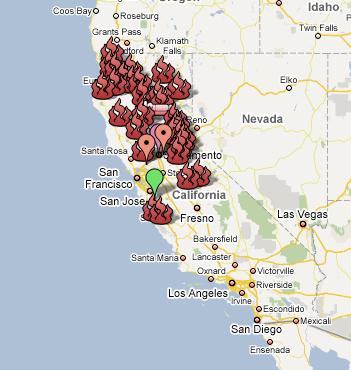There's something about going to school that keeps my brain active. I don't know if it's the sustained reading, the intellectual discussions, the constantly changing subjects and challenges--or just the motivation I get from regular essay deadlines. But since finishing my schooling (yeah, right, as if I'll never go back), my brain has definitely slowed.
Why isn't my brain as responsive as it used to be? Is it distracted by too much web surfing? Do I have a brain-eating amoeba? Is it the (I hope mythical) "mommy brain" that accompanies life with young children? Am I just too damn busy with too many projects, so I lack time to reflect? Am I spending too much time in that stream of constant interruption, 140-character world of Twitter? Has my RSS reader driven me to distraction? Is it just that my brain is aging and therefore less plastic that it was in my/our twenties?
I've devised many plans to get my brain back into shape, but procrastination has thus far kept me from many of them. Here are some of my ideas:
- Renew my commitment to challenging (e.g. academic) research, thinking, and writing. And lo! I have done this: I recently finished an (ambiguously and broadly defined) article on museums for a library science encyclopedia, I have an academic book review due in two days, and I've been revising an academic journal article that was all but accepted to a great women's history journal a year ago. Plus I'm teaching a couple graduate courses again this fall, as well as reading students' master's theses for the first time this spring.
- Figure out this whole "WordPress" thing for work. Too many plugins! Too many widgets and themes!
- Commit to learning a difficult foreign language (e.g. Arabic). Why must Rosetta Stone be so damn expensive? And why must local Arabic classes meet in the middle of the workday?
- Arts and crafts. I have a closet full of arts and crafts supplies that are calling to me. If only I could pull myself away from everything else I'm working on.
- Pick up the French horn again. This is hard because, well, the horn is a very loud instrument, and someone always seems to be asleep in this house. But someday I shall regain my mediocre embouchure.
- Learn more about gardening than I know now (i.e. "Put plant in ground. Water. Cross fingers.") Progress: I've planted two raised beds of summer fruits and vegetables, and so far nothing has died (again, fingers crossed).
My plans involve a blend of study and what Barbara Ganley has termed "noodling." BG writes about the healing power of noodling:
I’m tired of writing angry. Frustrated. Negative. And so I have stayed off-blog. Thinking. Feeling. Planning. Noodling. Doing. Tweeting. But not sharing writing longer than 140 characters at a stretch. Not until now. This morning when I whined a bit on Twitter about my lack of posting due to having little positive to say about schools, especially those of a private, liberal arts, expensive nature-Bud Hunt came right out and told me to move past the need to write about formal ed (i.e. get over myself) and write about the new thoughts, the new connections. With that one little nudge, I could feel myself start to shuck that snakeskin of academia and the baggage of nineteen years and be ready to start noodling around out loud about what I’m reading, thinking, dreaming and wondering.
Barbara has a kindred soul in Bethany Hiitola of Mommy Writer Blog. Hiitola is going through an annual ritual she calls "Clearing." She explains:
I let go of projects that aren't routine. I let work slide a bit instead of living the life of an over-achiever. And in the end, I spend quality time with myself, my family, and sorta experience life in order to "fill the well."
Sure, I'll still be blogging here. And reading. And writing. But no pressure. No substance. And hell, you might even get some delayed postings around here. But, it's all part of my process. My brain re-wiring itself for more creativity. Or at least I tell myself that so that I don't think of it as "lazy."
Other bloggers believe more firmly in studying. Beatricks of Easel Ain't Easy writes that taking a summer class is helping her brain to grow. Kirsten Fisch of Math Monkey has a variety of ways to keep her kids' brains active during the summer, including reading enrichment, math practice, Apple (computer) camp, creative writing, online classes, and learning guitar.
How do you stave off brain atrophy?



